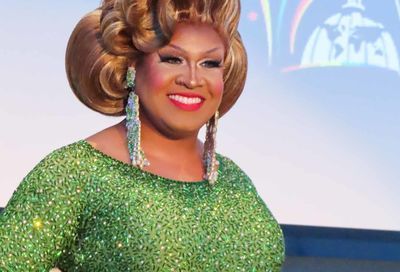Lesbian Sex Stats
Learning Curve
Have you ever been rudely jolted out of a dreamy Sunday morning sleep-in by a phone survey from the Centers for Disease Control (CDC)? Last weekend I was “randomly selected” for such a phone survey, and although initially irked by the wake-up call, I realized I had a great opportunity to become a healthy lesbian statistic. For the next twenty minutes, I helpfully answered questions about my exercise, diet and sex choices. Funny thing was, there was no place in the survey for lesbians.
That’s right — I was asked if I was married, single or divorced. I was asked several times if I was using birth control and if my health provider gave me information on condoms. I was invited to respond to questions on pregnancy, unprotected intercourse, and whether I faithfully used condoms during anal sex. Like a broken record (hey, folks, remember those, before compact discs?), I heard myself complaining over and over, “Look, that question doesn’t apply to me — but here is the answer about what I do!”
My abashed questioner was clearly reading from a script and instructed to follow a set order of specific inquiries. As politely as possible, I modified my answers with comments such as “I’d like the record to show that my partner and I…” Or, “Please note that my response is…”
Finally, I interrupted with a few questions of my own: Are you aware that you have “randomly” called a lesbian household? In Dupont Circle, a substantially gay community? Was anyone at CDC prepared for that possibility?
|
The reason I’m pissed is because research on lesbian health is notoriously sketchy, and here I was, a chosen research subject, and, if I may say so, proud to represent Lesbian Nation with my good cholesterol levels, blood pressure, and two-drinks-a-month moderation. Sure, let me be a poster girl for buff dyke health! Show the homophobes my lifestyle printout! Groove on my safe-sex consciousness! But there was no profile for girl-goin’-steady-with-girl — and utter disregard for my insistence that among the demographic of sexually active gals, condomless penetration does happen fore and aft, just without sperm in the starring role.
How lesbians negotiate safe sex, and how we struggle to stay healthy when confronted with a host of roadblocks (“family” memberships at health clubs that exclude our partners, extremists who picket and blow up women’s clinics that dispense pap smears and VD info as well as abortion info, etc.) is an important story. So I phoned the CDC in Atlanta to complain about the way lesbian invisibility was built into the health survey. In case you’ve never called the CDC, these are interesting times to do so: Push “2 ” on your phone if you are calling to report bioterrorism!
I got quite a runaround. First I was referred back to the National Center for Health Statistics here in Maryland. A nice woman at that number referred me to two different men who, separately, were supervising a “national health interview” and a family growth interview. These men then assured me that I needed to call a different number back in Atlanta because my phone survey sounded like the “behavior risk factor surveillance” done in each state since 1984. No one seemed to know how to respond to my point that D.C. is not a state.
By now I had spent several hours on the phone, but I finally connected with the right office in Atlanta, and a very cool woman spent good time with me on the phone, apologizing and assuring me that yes, I had been selected for their behavior risk factor survey (BRFS) — but it had been read to me incorrectly. “There is a category for unmarried couples,” she fumed. “Your caller didn’t do the survey right. Choice number six (after married, single, divorced) is unmarried couple.” It was a relief to know that my people are formally recognized as choice number six. I then asked this friendly woman about the other problem — that so many questions seemed geared toward heterosexuals or gay men, but ignored all sexual practices where the penis wasn’t involved. “Oh, it’s fine to volunteer answers that pertain to you,” she assured me. “If you give information to our surveyors, they have to record it.”
So! My daring honesty about just what I like and how I like it went down in the annals of American science. Yet after I hung up the phone, I was left with unresolved frustration — how many other nice homos awakened by a phone survey know they have a right to volunteer personal info not covered by the questions? In short, only a pushy, confident activist like me might dare to speak up with some revealing truths not covered by the BRFS. Being told by the CDC survey representative that it’s okay to editorialize is different, entirely, from the CDC designing a more inclusive survey, one with our “lifestyles” already on the menu of common practices — and common health risks.
These aren’t new issues. Collecting accurate information about, say, teen sex behavior has consistently terrified the U.S. government, with various proposed surveys shot down over the years by abstinence-only conservatives. And for another look at inaccurate stereotypes, check out the current volume of the National Women’s Studies Association Journal, or the current issue of our local feminist newspaper, off our backs. Both have devoted an entire volume to disability rights — including the ways disabled lesbians are rendered invisible, or interviewed incorrectly, by doctors/nurses/gynecologists. The homophobic creed “I don’t care what they do, as long as I don’t have to hear about it” has no place in medicine and science, especially when we have so much to teach health care providers about our own communities.
Bonnie Morris can be reached via email at bmorris@metroweekly.com.
Support Metro Weekly’s Journalism
These are challenging times for news organizations. And yet it’s crucial we stay active and provide vital resources and information to both our local readers and the world. So won’t you please take a moment and consider supporting Metro Weekly with a membership? For as little as $5 a month, you can help ensure Metro Weekly magazine and MetroWeekly.com remain free, viable resources as we provide the best, most diverse, culturally-resonant LGBTQ coverage in both the D.C. region and around the world. Memberships come with exclusive perks and discounts, your own personal digital delivery of each week’s magazine (and an archive), access to our Member's Lounge when it launches this fall, and exclusive members-only items like Metro Weekly Membership Mugs and Tote Bags! Check out all our membership levels here and please join us today!






















